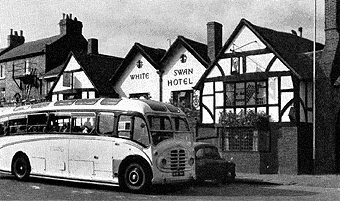Thomas Tilling Ltd. - A Brief History
by Howard Sprenger


Thomas Tilling Ltd. began operating as a bus company in London in 1897, and grew to become one of two huge transport holding groups that had interests in almost all of the major bus operating companies in the first half of the 20th century. The other conglomerate was British Electric Traction (BET) which had been formed in 1896, and in addition to the interests that Tilling held in its own right, others were also held in partnership with British Automobile Traction - itself a subsidiary of BET.
As the mainline railway companies grew, they developed extensive bus interests, and towards the end of the 1920s, these interests were transferred to Tilling and BET in exchange for minority shareholdings in the operating companies, and with the hope that coordination between road and rail could be improved. It is debatable whether this happy situation ever truly realised its full potential, but there was certainly more chance of it happening while the railways retained their bus interests.
In 1942 the companies in the jointly-owned Tilling and British Automobile Traction (TBAT) group were split between Tilling and BET, and the two groups continued to operate independently until nationalisation first reared its head in the late 'forties. The British Transport Commission (BTC) was formed in August 1947, and with separate executives for road, rail and canal, it acquired a major stake in all the Tilling and BET bus companies as a result of its railway holdings.
After a brief period of co-existence, Tilling sold its remaining holdings to the BTC at the beginning of 1949 for £24.8m. Meanwhile BET retained its independence, although the BTC ultimately gained up to a 50% holding in 17 of its companies. Thus, from 1949 there were still two major bus groups, BTC (formerly Tilling) and BET (part owned by the BTC).
The ex-Tilling companies included Brighton, Hove and District; Bristol; Crosville; Cumberland; Eastern Counties; Eastern National; Hants and Dorset; Lincolnshire Road Car; South Midland; Southern National; Southern Vectis; Thames Valley; United Automobile Services; United Counties and Western National. To these were added Mansfield and District, Midland General and Notts and Derby Traction. These three had all been owned by Balfour Beatty, which had sold out to the Midland Counties Electric Supply Co. When the British Electric Authority took over this concern with the nationalisation of the electricity industry on 1st April 1948, it found itself the owners of the three bus companies, which quickly passed to the BTC on 18th of the same month.
The BTC also took over the Bristol chassis works at Brislington near Bristol, and Eastern Coach Works (ECW) at Lowestoft. Its companies were therefore encouraged to order this chassis/body combination, which thence became unavailable to BET companies, municipals and independents. Long after the BTC took over, its ex-Tilling and Balfour Beatty companies continued to be referred to popularly as "Tillings", and the combination of an ECW body on a Bristol chassis was a sure sign that the owning company belonged to this group.
On 1st January 1963, a new body, the Transport Holding Company (THC) took over the bus assets of the BTC which consisted of 29 companies in the Tilling group and the 50% stake in 17 of the BET companies that the BTC had previously acquired. November 1967 saw BET sell its remaining bus interests to the THC, and this set the stage for the ultimate nationalisation of the bus industry (less the municipals and the independents) with the creation of the National Bus Company a year later.